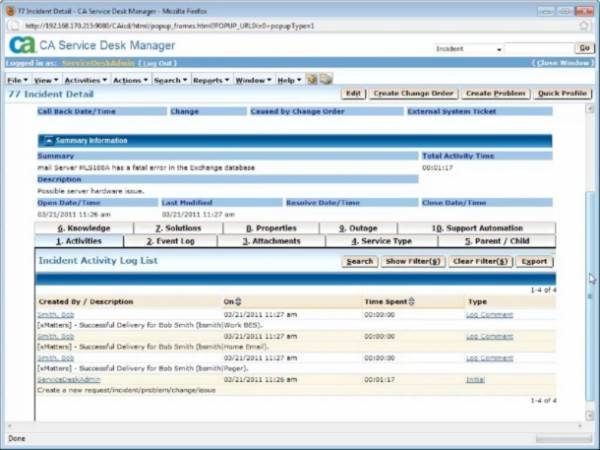One of the critical goals of automation is to instantaneously connect problems with the best and most readily available people to solve them. You could say if such a goal were truly achieved in an organization, an entire tier of middle management would be eliminated. And you may want to remind me, if you can, why that would be a bad thing.

An emerging class of middle-tier services in the cloud-driven SaaS model is the “decision engine” – essentially the algorithms and methods that produce results, and let the front end program handle the delivery and execution of those results. In an IT service organization, one such engine making inroads with a growing number of front ends (including just this week CA Service Desk Manager) comes from a company called xMatters, which calls its service a relevance engine.
The way CA Service Desk Manager was designed, the actual manager of every process is you. You certainly see every detail, but you’re the one controlling the switchboard; and in a multi-tenant scenario, you’re sharing that switchboard with at least a dozen other users. The purpose of xMatters is to perform some of the more obvious, and generally mundane, tasks in service management. These include connecting a new incident with the person best suited at that time to handle it, based on the person’s on-call schedule, availability, location, experience, and skill set.
Abbas Haider Ali, xMatters’ vice president and resident evangelist, explains how his relevance engine works first by observing the typical IT service shop: Suppose someone at a help desk has a client on the line. The client can’t access her core business application. Immediately, of course, the help desk specialist creates a ticket. “What typically happens at an IT organization is the assignment to get into a queue,” Haider Ali explains, “and then either an e-mail goes out to everybody on that team, and hopefully someone takes ownership of it, or the person at the help desk picks up the phone, calls the leader of the team whom he thinks should be dealing with the issue, and says, ‘Hey, can you assign someone to deal with this?'”

With xMatters integrated into CA Service Desk Manager, Haider Ali continues, “all that manual communication exercise goes away, because frankly, it’s silly. What happens is, our system is engaged at that point.”
The xMatters engine decides who’s best to handle such an issue. It then determines the best way to reach that person using point-of-presence information, perhaps with an SMS message, an e-mail, or in the case of supported mobile platforms (iOS, Android, and BlackBerry), a notice that comes up in the xMatters mobile app. Now, if that person actually isn’t available or ready, he may signal that to the system, and xMatters can move to the next available candidate in its queue. He may also give feedback indicating the incident isn’t really an incident (“This guy loses his logon password every other day!”), and give the system the necessary feedback.

In about 95% of xMatters deployments for IT service organizations, Haider Ali tells us, the engine is plugged into a front end such as CA’s. The engine has already supported BMC Service Impact Manager, HP Service Manager, IBM Service Request Manager, and Microsoft System Center Operations Manager. The company makes other relevance engines for different logistics sets, such as its Business Continuity engine used by major U.S. airports as communications hubs. For example, an airport operations manager may need the best and most readily available snow plows to handle a weather emergency.
In these large, logistics-bound organizations such as airports, IT service shops, and to an emerging extent, first response teams, doesn’t there need to be someone making sure the relevance engine is making the right choices?
Actually, yes. “In terms of the operational administrations of things like making sure the system is making decisions and sending them to relevant people, that investment actually tends to be a wash,” Haider Ali responds. “If you go to any of our clients, they still have to make those decisions somehow today. Either there’s someone whose full-time job is to be a human relevance engine, so information goes to them and they dispatch it to the next person in line, or they’re maintaining the rules of those [decisions] in runbooks, on SharePoint portals, and even on whiteboards. ‘For issues after midnight, call this number…’ There’s still someone who’s manually maintaining that information, but what they do is put that knowledge into our system, and then they simply keep it up to date. So on the whole, it doesn’t cost them any more, unless they’ve been doing things incredibly inefficiently in the past – which isn’t that rare, unfortunately.”
So relevance engines and decision engines may not be causing upheaval in the service organization. And as Abbas Haider Ali describes it, that may be all for the better anyway, as his goal is not for xMatters to replace people but to make the work they do more efficient.










